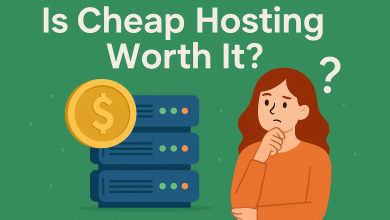Introduction: Choosing the Right Hosting Plan in 2025
Whether you’re launching your first blog, running a growing business, or developing a high-traffic app, your hosting choice matters more than ever in 2025. With rapid shifts in web traffic demands and performance expectations, understanding the difference between Shared, VPS, and Cloud Hosting is critical to your site’s success.
In this guide, we’ll break down each type, highlight pros and cons, and help you decide which is right for your needs—with trusted recommendations like Hawk Host to get you started.
1. Shared Hosting: Affordable and Beginner-Friendly
What is Shared Hosting?
Shared hosting places multiple websites on a single server. You share resources (RAM, CPU, bandwidth) with other users.
Best For:
- Beginners or hobbyists
- Small blogs or static websites
- Tight budgets
Pros:
- Lowest cost ($2–$5/month)
- Easy to use (cPanel, 1-click installs)
- Minimal setup required
Cons:
- Limited scalability
- Slower under high traffic
- Potential security concerns from other users on the server
Recommended Option:
👉 Try Hawk Host Shared Hosting – reliable, affordable, and great for startups.
2. VPS Hosting: Control and Customization for Growing Sites
What is VPS Hosting?
VPS (Virtual Private Server) hosting gives you a dedicated portion of a physical server. It mimics a dedicated server environment with your own resources.
Best For:
- Medium-sized businesses
- E-commerce stores
- Developers needing root access
Pros:
- More power and performance
- Greater control and security
- Scalable within your plan
Cons:
- Costs more ($10–$30/month)
- Requires some technical knowledge
Recommended Option:
🚀 Explore Hawk Host VPS Hosting – optimized resources, solid uptime, and developer-friendly tools.
3. Cloud Hosting: Scalable, Resilient, and Built for Traffic Spikes
What is Cloud Hosting?
Cloud hosting uses multiple interconnected servers. If one goes down, others pick up the load—making it highly reliable.
Best For:
- SaaS applications
- Large-scale websites
- Sites with unpredictable traffic
Pros:
- Auto-scalable resources
- Extremely reliable uptime
- Pay-for-what-you-use models
Cons:
- Can get expensive with high usage
- Slightly more complex to manage
Recommended Option:
💡 Hawk Host Cloud Plans offer hybrid solutions for users wanting both flexibility and simplicity.
Comparison at a Glance (2025 Edition)
| Feature | Shared Hosting | VPS Hosting | Cloud Hosting |
|---|---|---|---|
| Cost | $ | $$ | $$$ |
| Performance | Low–Moderate | High | Very High |
| Ease of Use | Very Easy | Moderate | Moderate–Advanced |
| Scalability | Limited | Moderate | Very High |
| Best For | Beginners | Growing websites | High-demand projects |
| Flexibility | Low | High | Very High |
How to Choose the Right Plan in 2025
Ask yourself the following:
- How much traffic do I expect in the next 6–12 months?
- Do I need full control over server configurations?
- Is my website mission-critical with no room for downtime?
If you’re just starting out or launching a personal site, go Shared. If you’re scaling up and need power and isolation, choose VPS. For large, dynamic projects, Cloud Hosting is the future.
Final Recommendation
Still unsure? Start small and scale as you grow.
👉 We recommend Hawk Host for flexible plans, affordable pricing, and eco-conscious performance—perfect for every stage of your hosting journey.
Conclusion: The Right Hosting Powers Your Online Success
In 2025, choosing the right hosting isn’t just about price—it’s about performance, reliability, and growth. Whether you’re blogging from your kitchen or launching the next big platform, matching your hosting type to your goals is key.
Don’t wait. Make a smart, scalable choice now with Hawk Host Hosting Plans and start building the future of your online presence—efficiently and sustainably.





